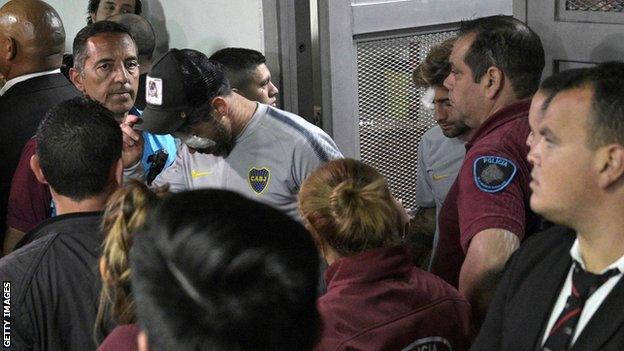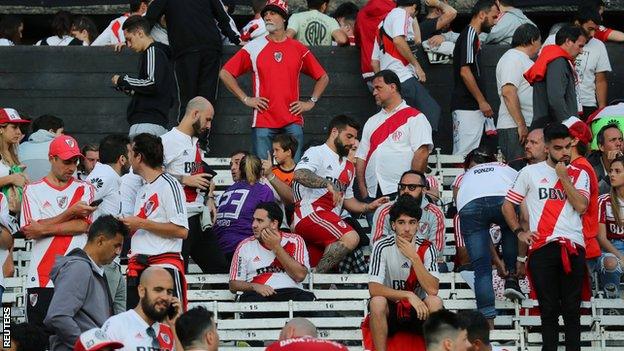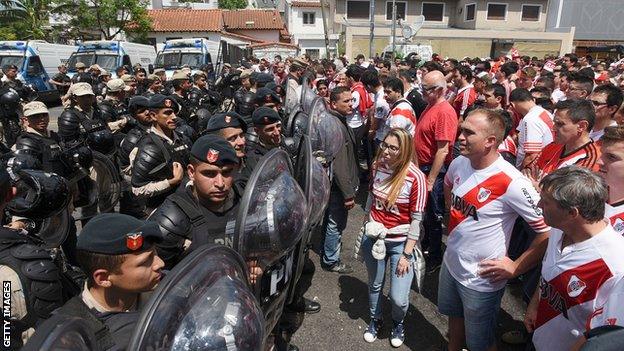River Plate v Boca Juniors Copa Libertadores final postponed after bus attack
- Published
Football final postponed after team bus attack
A "shameful" attack on the Boca Juniors team bus by River Plate supporters has led to the postponement of the final of the Copa Libertadores second leg.
The game between the two fierce Argentine rivals will now take place on Sunday at 20:00 GMT in Buenos Aires, 24 hours later than originally scheduled.
The announcement - made by River Plate on Twitter, external - came after more than two hours of confusion at River's Monumental stadium, during which the kick-off was put back twice - first to 21:00 GMT and then to 22:15 GMT.
Boca players suffered cuts from the glass from broken windows and were also affected by the tear gas used by police to disperse the crowds.
A number of players, including Boca's former Manchester City, Manchester United and Juventus striker Carlos Tevez, reportedly suffered from dizziness and vomiting and were being treated by club doctors.

Boca Juniors midfielder Pablo Perez (centre) and defender Leonardo Balerdi were pictured wearing eye patches
Footage apparently from inside the Boca dressing room showed the players groggy and disorientated.
Reports said Boca's Pablo Perez and Gonzalo Lamardo had been taken by ambulance to hospital, the former with slivers of broken glass in his eyes and the latter a cut on his head.
"Pablo has just returned from hospital and has a bandage on his eye," Tevez told reporters before the postponement was confirmed.
"Other team-mates have cuts. We've only just been able to breathe well because we were affected by the gas. We can't play like this," he added.
"In these conditions the game was distorted. One team couldn't play and the other doesn't want to play against a rival that isn't in the right conditions," explained Alejandro Dominguez, the head of South American football's governing body, Conmebol.
"This should shame us as a society and I find it very sad that we have to reschedule such an important match," said Boca president Daniel Angelici.
"It's not easy to take this decision when there are 60,000 people in the stadium and the television rights have been sold to a ton of countries. But the most important thing is to look after the physical and psychological condition of the team."
River president Rodolfo D'Onofrio added: "As an Argentine and as a football leader, I find this shameful. [But] it's the right decision and we hope to be able to play in peace on Sunday."
The attack occurred as the team made its way to River's Estadio Monumental in Buenos Aires for the second leg of the final. Last week's first leg at Boca's ground ended in a 2-2 draw.
Former Argentina striker Gabriel Batistuta, external also branded the scenes "shameful", saying on Twitter: "Another opportunity lost in front of the whole world that observes us, shameful, lamentable."
The Copa Libertadores is the showpiece club competition in South America, equivalent to the Champions League in Europe. The clubs had agreed to a ban on away fans which mirrors an existing ban in domestic football in Argentina.
Three years ago, a last-16 Copa tie between River and Boca at the latter's La Bombonera ground was abandoned at half-time after Boca fans attacked the River players with pepper spray in the tunnel.
Boca were kicked out of the competition, while River were given a bye into the quarter-finals.

River fans were left waiting for updates inside the stadium following the attack on the Boca bus
'Argentina showed the ugliest side of its football'
BBC Americas editor Leonardo Rocha reports:
The head of South America's football confederation, Alejandro Dominguez, said several players had been injured and officials from both River Plate and Boca Juniors agreed to postpone the match.
This was the most anticipated game in the history of the two Argentine football giants. They were facing each other for the first time in a big South American final.
But there's a sense of frustration and embarrassment now in Buenos Aires. And concern about the prospect of further violence. The whole world was watching, wrote one of the country's main newspapers, and Argentina showed them the ugliest side of its football.

There was a very heavy police presence outside the stadium
'Tiresome, dangerous and idiotic'
World Service radio producer Richard Padula at the Estadio Monumental:
It was the final nobody wanted - a rivalry too intense for a match this big.
Three hours before kick-off, the stadium was almost full. The songs were loud and heartfelt. But slowly the news of the attack on the Boca team bus began to filter through. And then the pictures.
No announcements, just rumours on social media. Kick-off was delayed. But, we were told, the game would go on. Time passed. Still no sign of the players or team sheets.
At one stage cones and balls were laid out for the pre-match warm-up. But the warm-up never took place - and neither did the match.
Overseas visitors love Argentine football. The passion, the fervour, the colour, the characters. It's easy to romanticise the game here. But for those who live with it everyday it can be tiresome, dangerous and idiotic.
And now this.
The Superclasico - a brief history
The Superclasico between Buenos Aires clubs River and Boca is regarded as one of the most famous derbies in world football.
Their bitter rivalry dates back to when the two clubs where situated just a few miles from one another - in the city's La Boca region - between 1905 and 1923.
When football in Argentina became professional in 1931, River - who had relocated to Buenos Aires' Recoleta district eight years earlier - opted to spend big on new acquisitions, earning themselves the nickname 'Los Millonarios'.
River's spending only stoked the already heated rivalry between themselves and Boca, who have never left the city's working-class La Boca neighbourhood.
Since then, the two clubs have collected 69 league titles between them - River have won the Argentine top flight 36 times, while Boca have 33 titles to their name.
This is the first time in the 58-year history of the Copa Libertadores the two teams have faced each other in the final of the competition.